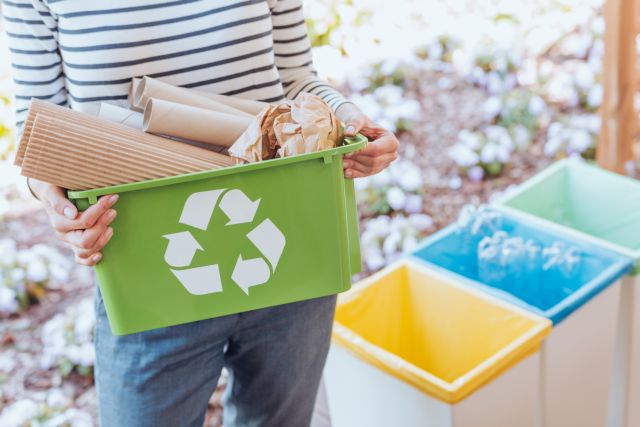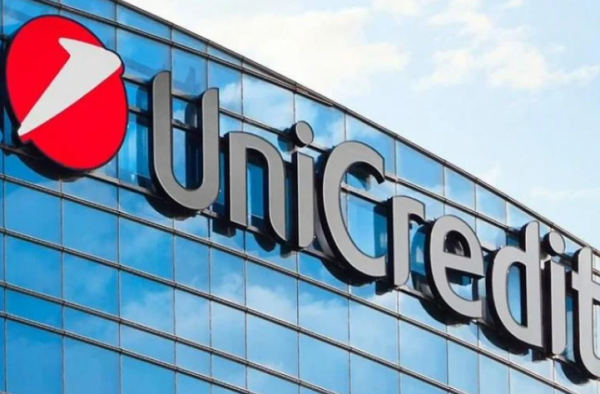
All new buildings must be provided with adequate space for collecting and storing at least four streaming units in suitable containers, while uniform color codes are required for waste collection bins to facilitate readability by citizens.
At the same time, the Municipalities will now be able to implement the “pay as I fly” system by charging citizens lower municipal fees for all those who produce less waste and recycle more, and not on the basis of the square footage of their properties – as is the case today.
The implementation of “Pay as I waste” on a mandatory basis for the Municipalities starts from January 2023, with application to major waste producers such as large hotels and industrial facilities, while it becomes mandatory from January 1, 2028 for all Municipalities with a population of over 20,000 inhabitants.
These, among other things, are provided by the new draft law of the Ministry of Environment, which forms a new framework for waste management. Along with the implementation of the measure “Pay as I waste” the landfill fee is extended and modernized.
Thus, in order to prevent landfill, a landfill fee of 20 euros per ton of municipal waste will be introduced from 1 January 2022, which will increase by five euros per ton per year, while from 1 January 2026 it will be set at 45 euros and from 1 January 2027 at 55 euros per ton, a price that will remain stable for years to come.
Creative Materials Reuse Centers
The new design promotes reuse, as one of the key prevention measures in waste generation. For this reason, Centers for Creative Reuse of Materials (KDEY) are created in the Municipalities.
In particular, the Municipalities with more than 20,000 inhabitants are obliged to develop and operate at least one Center for Creative Reuse of Materials (KDEY).
These are essentially organized spaces, where citizens will be able to deposit second-hand items of all kinds, such as, but not limited to, electrical and electronic equipment, toys, furniture, bicycles, books and textiles. These products are classified and repaired in order to be reused.
In order to promote the prevention of food waste, a goal is set to reduce food waste by 30% in 2030 compared to 2022. To this end, the donation and redistribution of food for human consumption is encouraged, with priority given to human nutrition over use as and the reprocessing of non-food products and lays down the obligations of donors and recipients and the minimum conditions for the safety of human health.
In addition, from 1.1.2022 it becomes mandatory for a number of companies (such as food processing units, food supermarkets, hotels, large restaurants, catering companies, etc.) the systematic recording of food surpluses.
Repairability
Repairability is still being promoted. Manufacturers or importers of furniture and electrical and electronic equipment are obliged to inform the seller about the availability of the necessary spare parts and its time period and this information is made known to the buyer.
Producers and importers, by 2024 at the latest, organize and operate SEDs, assuming all their waste management costs, including their separate collection, for a range of products, such as greenhouse plastics and irrigation pipes, pharmaceuticals intended for household use, textiles, mattresses, furniture, toys and sports equipment, electric skates and electric bicycles.
Refund system for disposable bottles
The operation of the warranty system for aluminum packaging and disposable glass bottles is established from 2023, with the return of the guarantee price to the citizen when he returns the empty packaging in addition to a corresponding obligation that has already been established for plastic bottles. This measure is already applied in other European countries, such as Spain, Germany, the Scandinavian countries, etc.
Promotion of separate waste collection
Until January 1, 2024, the Municipalities are obliged to organize the separate collection of hazardous waste in households from everyday items, such as cleaning products (bleach, etc.), varnishes, paints, etc., as appropriate, or in store for sale either in their green areas or in any other licensed area indicated by the relevant Authorities for the Disposal of Solid Waste.
In addition to the mandatory separate collection of biowaste by the end of 2022 by the Municipalities, there is an obligation for separate collection and recycling of bio-waste of large producers with their responsibility and coverage of the relevant costs, while at the same time a relief of their relevant municipal fees is foreseen.
In order to develop and consolidate environmental awareness, from September 1, 2022, the mandatory separate collection of paper, glass, plastics, metals, batteries and food waste is introduced in schools.
From 1.1.2022, the General Government bodies organize the separate collection of paper in all their facilities.
The obligation for the separate collection of waste materials is extended, ie paper, glass, metals, plastics. Furthermore, penalties are provided in case of non-implementation of the measure.
In all new buildings it is mandatory to provide a suitable space for the collection and storage of at least four streams of waste in suitable containers. This will facilitate the separate collection, the implementation of “I pay as much as I fly”, but also the reduction of bins on the road.
Promotion of ecological packaging design
Ecological design is promoted especially in plastic packaging with measures such as:
· The differentiation of the contribution to SEDs depending on the recyclability of the plastic,
· The introduction from January 2025 of the obligation for a minimum recycled content of 30% in plastic bags, while from January 2023 (2 years earlier), the same measure applies to General Government Bodies which are prohibited from supplying plastic bags not containing at least 30% recycled plastic,
· And the introduction of an environmental tax for PVC-labeled plastic bottles. In particular, from 1 June 2022, an 8-cent recycling fee is imposed on products whose packaging (label) contains polyvinyl chloride (PVC) upon sale at any legal point of sale. The fee is charged to consumers per piece of product in accordance with the practice of plastic bags.
Spatial planning – Urban planning
With the new draft law there are also provisions for spatial planning and urban planning. Thus, as it became known, it is now possible to suspend the construction work during the preparation of the Special Urban Plans, a program that will “run” in parallel with the Local Urban Plans in the near future.
The start of the Local Urban Plans (TPS) is expected to put a brake on the off-plan construction. The TSIs will determine land uses, building conditions and protection areas throughout Greece.
It is also provided that the interested owners in cases of road expropriations, which have been automatically lifted due to the expiration of the 18-month period from the court determination of unit price, to be able to submit an application and a responsible statement to the debtor for compensation. expropriation and the payment of the judicially determined temporary or final compensation until 31 December 2024.
Category 3 of building permits also explicitly includes the cases of addition to a legally existing building, using a special building, provided that the addition does not exceed 50% of the existing construction and in and out of plan construction, as well as the installation of underground liquid tanks and gaseous fuels at service stations.
Latest News

Airbnb: Greece’s Short-Term Rentals Dip in March Amid Easter Shift
Data from analytics firm AirDNA shows that average occupancy for short-term rentals dropped to 45% in March, down from 49% the same month last year.

Easter Week in Greece: Holy Friday in Orthodoxy Today
At the Vespers service on Friday evening the image of Christ is removed from the Cross and wrapped in a white cloth

Meloni and Trump Meet in Washington, Vow to Strengthen Western Ties
“I am 100% sure there will be no problems reaching a deal on tariffs with the EU—none whatsoever,” Trump stressed.

ECB Cuts Interest Rates by 25 Basis Points in Expected Move
The ECB’s Governing Council opted to lower the deposit facility rate—the benchmark for signaling monetary policy direction—citing an updated assessment of inflation prospects, the dynamics of underlying inflation, and the strength of monetary policy transmission.

Current Account Deficit Fell by €573.2ml Feb. 2025: BoG
The improvement of Greece’s current account was mainly attributed to a more robust balance of goods and, to a lesser extent, an improved primary income account

Hellenic Food Authority Issues Food Safety Tips for Easter
Food safety tips on how to make sure your lamb has been properly inspected and your eggs stay fresh.

Greek Kiwifruit Exports Smash 200,000-Ton Mark, Setting New Record
According to data by the Association of Greek Fruit, Vegetable and Juice Exporters, Incofruit Hellas, between September 1, 2024, and April 17, 2025, kiwifruit exports increased by 14.2%.

Easter Tourism Boom: Greece Sees 18.3% Surge in Hotel Bookings
Among foreign markets, Israel has emerged as the biggest growth driver, with hotel bookings more than doubling—up 178.5% year-on-year.

Greece to Launch Fast-Track Tender for Offshore Hydrocarbon Exploration
Last week, Papastavrou signed the acceptance of interest for the two Cretan blocks, while similar decisions regarding the two Ionian Sea blocks were signed by his predecessor

American-Hellenic Chamber of Commerce to Open Washington D.C. Branch
AmCham's new office aims aims to deepen U.S.-Greece economic ties and promote investment and innovation between the two countries







![Πλημμύρες: Σημειώθηκαν σε επίπεδα ρεκόρ στην Ευρώπη το 2024 [γράφημα]](https://www.ot.gr/wp-content/uploads/2025/04/FLOOD_HUNGRY-90x90.jpg)




![Airbnb: Πτωτικά κινήθηκε η ζήτηση τον Μάρτιο – Τι δείχνουν τα στοιχεία [γράφημα]](https://www.ot.gr/wp-content/uploads/2024/07/airbnb-gba8e58468_1280-1-90x90.jpg)























![Airbnb: Πτωτικά κινήθηκε η ζήτηση τον Μάρτιο – Τι δείχνουν τα στοιχεία [γράφημα]](https://www.ot.gr/wp-content/uploads/2024/07/airbnb-gba8e58468_1280-1-600x500.jpg)


 Αριθμός Πιστοποίησης
Αριθμός Πιστοποίησης